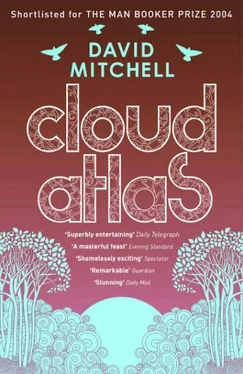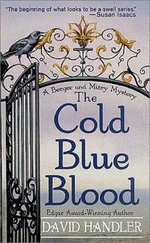“Before he left, I told Saburo I wanted him to leave behind a sketch of himself. He said he would, but when he finally got ready to go, he gave me these pages.”
“This is you,” I said, looking up at her to compare.
“He said every face he tried to draw came out as me. I told him he should have tried harder, but he said if I looked at these sketches long enough, I’d see all of him I needed to see.”
“That’s romantic,” I said, not even teasing.
“Doesn’t look like him or me,” she said. She reached toward me and turned one of the pages over, revealing a more familiar terrain of sketches and maps and charts. “I saw him here, though.” She traced her finger slowly down the slope of what looked like a cloud. “And here. And here.” She sat back. “I look at these pages and I see all of him. I remember him hunched over, making these charts, explaining as he went.”
I sifted through the papers a little more, and then came back to the page with her portraits. “So how’s this going to help me become a better palm reader? Just stare at you long enough-?”
Lily took the pages. She shuffled back and forth through them until she found what she was looking for, and then held it out to me. A column of Japanese characters ran down the left-hand side of the page. In the middle was a gray-green blob, with a crosshairs in the lower right. Tiny numbers were written in each of the crosshairs’ four quadrants, and at the bottom of the page, a single word in English characters, which I read aloud: “Shuyak.”
When I looked up, Lily’s eyes were full of tears. “Any drunken soldier who walked into that building and actually wanted his palm read, I could tell him anything. But you-once I knew you actually did work related to what Saburo was doing-that you might have access to that journal—” She stopped. “Like I said that night I first told you about Saburo-I wanted to be useful to you.”
“Useful?” I was discovering what it was like to be Gurley; I could feel rage uncoiling inside me, seeking out a fist or arm. “And Gurley?” I said, to stall.
“Yes-or no. I mean, I knew he was involved, but eventually I realized he wouldn’t help. Couldn’t. And then it was too late. Things with Gurley-I don’t know.”
“You tricked us?”
“Louis,” she said. “I wanted you to need me. I needed you to.”
“Gurley too?” I asked, but she didn’t say anything. I felt her hand inching closer to mine again, but I didn’t move. I tried very hard to stare at the page before me and nothing else. “You were helpful,” I finally said. “Or, I guess Saburo was. But how did he know about Shuyak? Portage around the Katmai volcanoes? Kayak across the Shelikof Strait?”
Relieved, I think, to submerge into detail, Lily began speaking rapidly. “Shuyak was an old crash site, one he’d heard about before he’d come to Bethel. I sent you there thinking you’d find an old balloon, not another one, a new one.”
I quickly scanned the other pages with new eyes and saw rivers, peninsulas, mountains, even towns emerge. One page looked particularly interesting. Green to the left and then a series of arrows to the right. Had Saburo known about plans for germ bombs? Had he told her? I wanted to ask her, but I couldn’t. I was so angry and sad and defeated, I didn’t want to know. More than that, I didn’t want to see her lie, not to me.
She saw me studying the page. “I don’t know what that means,” she volunteered. “We were going to go through the whole book, him explaining, me figuring out, translating names, but we didn’t get any farther than Shuyak.” I didn’t want her to say another word.
“So you lied about being a palm reader,” I said, the anger in my voice surprising me more than her. “You lied about-or didn’t let on why you thought I’d be so useful. Did you also lie about your supposed ‘powers’? You hold something, and you know its story? How the hell did you know about me? About who I was? My childhood?” She snatched the papers away and crumpled them, tighter and tighter. “Did-did Gurley tell you? Was that a trick, too?”
“No, Louis,” Lily said.
“So what am I thinking now?” I said. “Read my thoughts. Prove it.” But there was nothing to read. I can’t tell you what I was thinking. I was angry, but it was a boy’s anger, fiery and violent and insensible, and even if you’d cracked my skull open to look inside, you would have seen nothing, only red.
I don’t know what Lily saw. She said she saw nothing anymore.
“That’s part of the reason I came all the way out here.” She held the ball of paper to her nose and mouth and breathed in. “In the city, in Anchorage, the longer I’ve been here, the harder it’s been, the more everything-everything I know-is fading.” She took the papers away from her face and put them in her lap, absently smoothing them out. “I see Saburo now, but I don’t know if that’s the paper or just memory. And even those memories-I’m losing those, too.” She dropped the papers, found a crevice in the rock and wedged her fingers there, closed her eyes. After a minute, she’d stopped crying and was breathing deeply.
“There is a story, Louis,” she began. “About a boy, a baby boy, and his mother, that’s been told for many years…”
I stopped her. I couldn’t hear it. I wonder now what would have been different if I’d let her tell the story, the whole story, then, if I’d just been patient enough to hear her out. But I wasn’t. I didn’t say a word, I just raised a hand, and she stopped. She didn’t argue, but just looked at me, disappointed and resigned.
“You really believed,” she finally said.
I nodded and sighed and slipped the papers back toward me. I studied them for a few minutes until she spoke again. Then she said, “Look.”
I turned, slowly, and saw nothing. But as I turned back, something above us distracted me, and I looked up to see something like clouds, or thinner than that, mist, twisting and undulating, changing colors as it did.
It would have done no good to tell me that I was seeing the aurora borealis for the first time and nothing more. This deep in the woods, this deep in the war, this far along with Lily: nothing was real anymore, at least nothing that I could not see, right at that moment.
And the lights above me, these I could see. I slowly leaned back until I was lying there, staring, looking up and watching the display, wondering if this was magic, or if the book had been, or the balloons, or if Lily was a magician, or Saburo, or Gurley
“Lily,” I finally whispered, worried the lights above were too fragile for me to speak any louder. Lily made no reply. I called her name, and when there was still no reply, I craned my neck to see if she was still there. She wasn’t. Then I surprised myself. Instead of leaping to my feet and running off the rock to find her, I lay there, staring up. I suppose the word is hypnotized , but that doesn’t give me enough credit. I was entranced, but I wasn’t in a trance. It was like it always was with Lily: a debilitating fascination. So I lay there, and after a while, I heard her voice. She wasn’t far away.
“I had seen the northern lights growing up in Bethel, but in Fairbanks, it seemed like we could see them almost all the time.” I kept staring at the sky, now pulsing. “Are you scared?” she asked.
I shook my head. I wasn’t scared, just surprised. Minutes ago, I had wanted to scream. I had wanted to hit someone. Lily. And now here I was, lying on the ground, looking at the sky. If it wasn’t Lily’s magic, then it was Alaska ’s, made present by the northern lights.
“Some people get scared. Of course, in Fairbanks, nobody was. The lights were as familiar as rain. But one March, far earlier in the evening than was usual, a tremendous red cloud of light appeared, just to the north. The lights had only just gone out in the dormitory, and as soon as they had, the cloud became instantly visible to all of us inside. We rushed to the window and watched it fold and wave, first one way then the next. And then suddenly—” Lily slapped her hands together, and the light show above me disappeared. I blinked, squinted, and then blinked again.
Читать дальше












